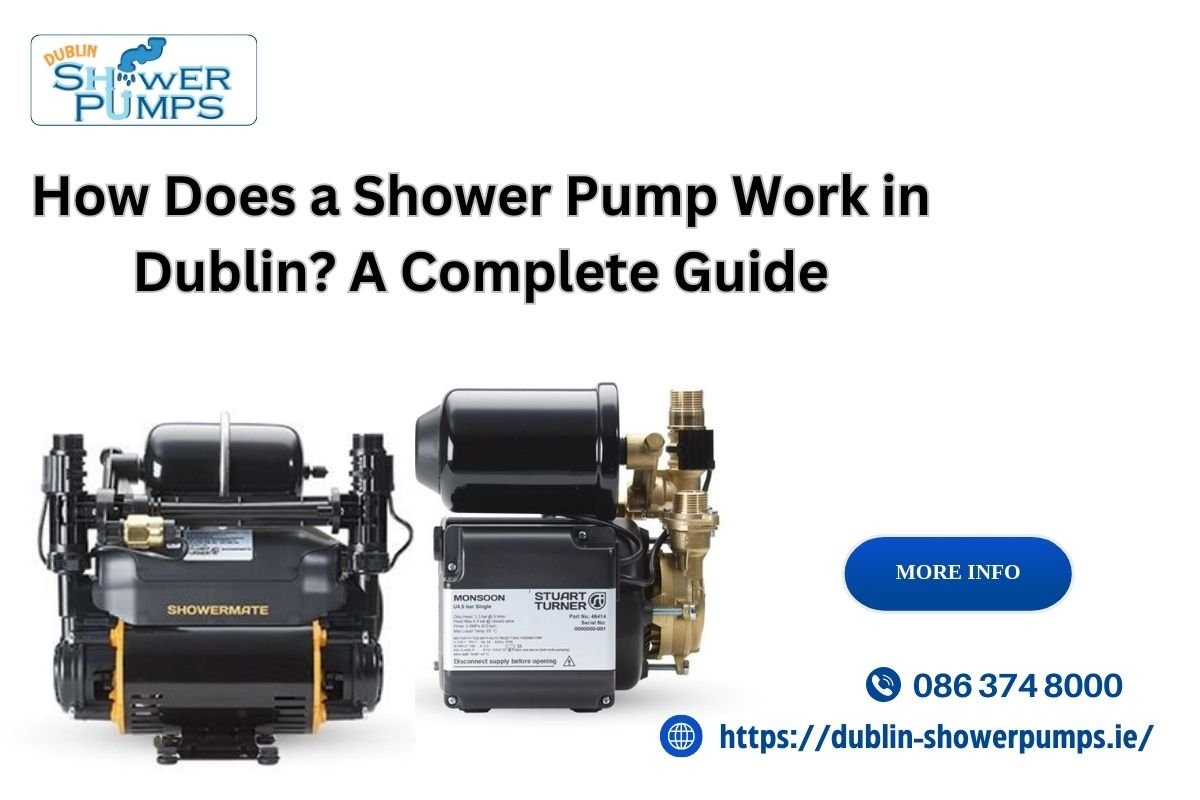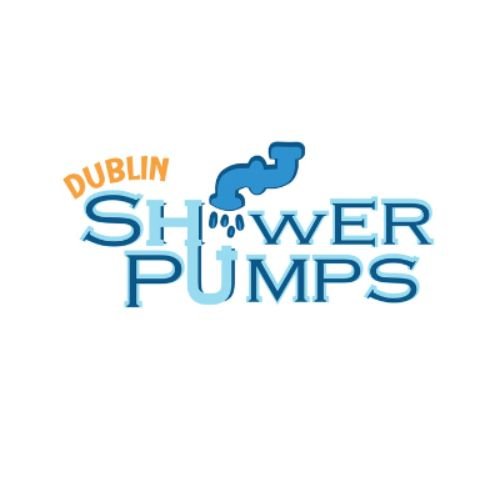How Does a Shower Pump Work in Dublin? A Complete Guide
A powerful and invigorating shower can set the tone for your entire day. However, low water pressure can turn this daily ritual into a frustrating experience. If you live in Dublin and struggle with weak shower pressure, a shower pump could be the perfect solution.
But how does a shower pump work in Dublin, and how can it improve your home’s water pressure? In this comprehensive guide, we’ll explore everything you need to know—from how shower pumps function to the different types available, installation tips, common issues, and how to choose the best model for your needs.

What is a Shower Pump?
A shower pump is a mechanical device designed to boost water pressure in your home’s plumbing system. It ensures a stronger, more consistent water flow to your shower, making it ideal for Dublin homes with:
Older plumbing systems
Low water pressure from the mains
Multi-story buildings where gravity-fed systems struggle
High-demand bathrooms with multiple showers
By installing a shower pump, you can transform your shower experience, ensuring a powerful and refreshing flow every time.
How Does a Shower Pump Work in Dublin?
Understanding how a shower pump works in Dublin is essential before making a purchase. Here’s a step-by-step breakdown of the process:
1. Water Intake
The shower pump draws water from your hot and cold water storage tanks (or directly from the mains, depending on the system).
2. Pressurization
Inside the pump, impellers (rotating blades) spin rapidly, increasing the water pressure before it reaches your showerhead.
3. Delivery
The pressurized water is then sent through your pipes, ensuring a strong, steady flow for a more satisfying shower.
For professional installation, check out our Dublin Shower Pump Installation Guide.
Types of Shower Pumps Available in Dublin
Not all shower pumps work the same way. Depending on your home’s plumbing system, you may need one of the following:
1. Single Impeller Pumps
Boosts either hot or cold water (not both).
Best for homes where one water supply has weaker pressure.
2. Twin Impeller Pumps
Boosts both hot and cold water equally.
Ideal for balanced shower systems.
3. Positive Head Pumps
Requires gravity-fed water pressure (minimum 0.6 liters per minute).
Best for homes with decent existing flow.
4. Negative Head Pumps
Works in low-flow systems (below 0.6 liters per minute).
Essential for homes with high showerheads or long pipe runs.
For help choosing the best brand, visit our Top Shower Pump Brands in Dublin guide.
Benefits of Installing a Shower Pump in Dublin
Why should you consider a shower pump? Here are the top advantages:
✅ Stronger Water Pressure – Enjoy a powerful, spa-like shower every day.
✅ Energy & Water Efficiency – Faster rinsing means less water waste and lower bills.
✅ Increased Home Value – Modern plumbing upgrades boost property appeal.
✅ Compatibility with Multiple Showers – Ideal for family homes with high demand.
✅ Quieter Operation (Modern Models) – Newer pumps are designed for minimal noise.
How to Install a Shower Pump in Dublin
Proper installation is critical for performance and longevity. Here’s a quick guide:
Step 1: Choose the Right Location
Install close to the hot water cylinder and below the cold water tank.
Ensure easy access for maintenance.
Step 2: Ensure Proper Ventilation
Pumps generate heat, so good airflow is essential.
Step 3: Use Correct Pipework
Flexible anti-vibration couplers reduce noise and wear.
Step 4: Prime the Pump
Fill the pump with water before turning it on to prevent airlocks.
For a detailed step-by-step guide, read our Shower Pump Installation Tips.
Common Shower Pump Problems & Fixes
Even the best shower pumps can encounter issues. Here’s how to troubleshoot them:
1. Low Water Pressure After Installation
Check for blockages in the filters.
Ensure the pump is correctly sized for your home.
2. Noisy Operation
Could be due to airlocks—learn how to fix airlocks in shower pumps.
Ensure the pump is securely mounted to reduce vibrations.
3. Pump Not Starting
Check the power supply and wiring.
Inspect flow sensors for faults.
If your pump is beyond repair, learn how to replace a shower pump in Dublin.
Best Shower Pump Solutions for Dublin Homes
If you’re dealing with weak water pressure, these top-rated shower pumps are worth considering:
🔹 Stuart Turner Monsoon – Best for high-pressure needs.
🔹 Salamander CT50 – Great for small to medium homes.
🔹 Grundfos Home Booster – Ideal for whole-house pressure boosting.
For expert recommendations, see our Best Shower Pumps in Dublin guide.
Final Thoughts: Is a Shower Pump Right for You?
A shower pump can revolutionize your daily routine, providing strong, reliable water pressure in any Dublin home. Whether you live in an older property or a multi-story building, the right pump can enhance comfort and efficiency.
By understanding how a shower pump works in Dublin, you can choose the best model, install it correctly, and enjoy years of powerful showers.
Need Professional Help?
For expert installation and advice, contact Dublin Shower Pumps today!
Frequently Asked Questions
A shower pump is a device that boosts water pressure in your home’s plumbing system. It works by drawing water from your hot and cold water supplies, pressurizing it using an electric motor and impellers, and delivering it to your shower at a stronger, more consistent flow.
You may need a shower pump if:
✔ Your shower has weak or inconsistent water pressure.
✔ You live in an older home with outdated plumbing.
✔ Your shower is on an upper floor (where gravity-fed systems struggle).
✔ You have a power shower or multiple bathrooms in use at once.
Positive Head Pump: Requires some existing water pressure (at least 0.6 liters per minute) to activate. Best for gravity-fed systems where the tank is above the shower.
Negative Head Pump: Works in low or no-flow situations (e.g., showers below the water tank). Ideal for homes with high showerheads or long pipe runs.
While some DIY-savvy homeowners can install a shower pump, professional installation is recommended to:
✔ Ensure correct positioning (near the hot water cylinder, below the cold tank).
✔ Avoid airlocks, leaks, or incorrect wiring.
✔ Maintain warranty validity (some brands require professional fitting).
Prices vary based on type, brand, and power:
Basic single impeller pumps: €150–€300
Twin impeller pumps (balanced pressure): €300–€600
High-end models (whole-house boosting): €600–€1,200+
Installation costs typically add €100–€300, depending on complexity.
Modern shower pumps are designed to be quieter, but some noise is normal. To minimize sound:
✔ Install with anti-vibration mounts.
✔ Place in a well-insulated cupboard.
✔ Opt for a brand known for quiet operation (e.g., Stuart Turner, Salamander).
Common issues and fixes:
🔹 Low pressure? → Check for blocked filters or incorrect sizing.
🔹 Noisy? → May have airlocks—try bleeding the system.
🔹 Not turning on? → Verify power supply and flow sensors.
With proper maintenance, a quality shower pump lasts 5–10 years. To extend its lifespan:
✔ Clean filters every 6 months.
✔ Avoid dry running (always ensure water supply).
✔ Schedule annual checks for wear and tear.
No—in fact, it can save water by:
💧 Reducing shower time (faster rinsing).
💧 Preventing weak flow waste (less water dribbling unused).
Top-rated brands include:
🏆 Stuart Turner (best for high pressure).
🏆 Salamander (great for mid-range budgets).
🏆 Grundfos (ideal for whole-house systems).
Most combi boilers already pressurize water, so a shower pump is usually unnecessary. However, if you have low pressure from a combi system, consult our experts for specialized Boiler solutions.

